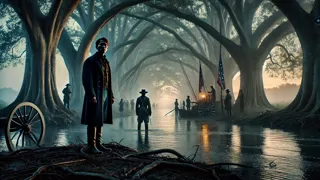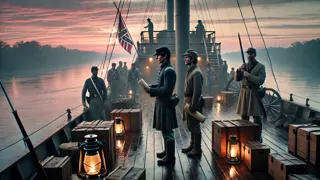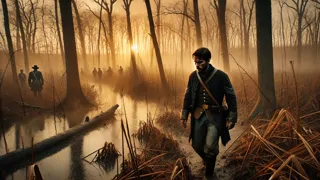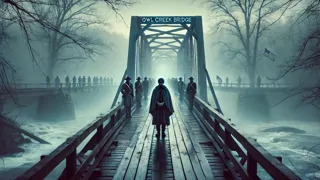Introduction
In the waning dawn of November 1864, a chill mist rolled over the swollen currents of Owl Creek, cloaking the wooden timbers in a spectral haze. Carter Richmond stood blindfolded at the center of the bridge, his wrists bound tightly behind his back, the coarse rope biting into skin already bruised by captivity. Soldiers in gray and blue moved with solemn purpose, their rifles angled toward him as if he were the very lightning God had sent to ignite a storm. Behind Richmond’s tightening chest beat the measured rhythm of fear and resolve; each heartbeat felt as though it would stave off the noose he was certain would close around his throat. He recalled the long nights smuggling coded dispatches through backwoods paths, the hidden blade sewn into his beltline, the promise he made by lantern light to the Union command in Louisville: bring news of the Confederate maneuvers or die trying.
Far below, the turbulent creek battered the pilings, carrying fragments of fallen leaves in its swirl. A faint wind whispered through the skeletal limbs of sycamores lining the bank, carrying with it a sorrowful hush. Richmond’s mind drifted to the faces he loved—his sister’s steady gaze, his betrothed’s tear-damp cheek—yes, he would chase every second of breath to reach them again. But the plank beneath his boots creaked under the weight of inevitability. Soon, cold steel would press against his back and the plank would give way. Still, as the oak timbers groaned and the soldiers formed an arc to conceal their apprehension, Carter Richmond imagined a tiny flame of hope flickering in the gloom. That fragile spark would guide him through the final moments at Owl Creek Bridge, and, if Fortune favored him, carry him back to life itself.
Bound on the Bridge
The convicts would say that time curdles when a rope settles around a man’s neck—every breath drawn becomes a thunderclap, every heartbeat a drum roll heralding the final act. Carter Richmond felt the noose press against the back of his skull in that electric hush, and the world narrowed to the board beneath his boots and the grey sky overhead. He swayed slightly as two uniformed guards roughly adjusted his feet on the edge of the platform, coaxing the stand from which he would shortly fall. Each officer’s face was steeled against empathy; their eyes betrayed only duty, not cruelty. The plank trembled with each bootstep, as if it sensed the enormity of its purpose. Richmond’s hands had long since gone numb, but the rope gnawed at his flesh with every millimeter of tightening, reminding him of mortality in the keen language of pain.
He summoned the memory of warm hearths left behind, of coded letters hidden in church hymnals, of the day he pledged his young life to a cause that now stood between him and the river below. A snap of movement to his left—an officer signaling the hangman—stole a fragment of his resolve. Yet he anchored his mind on one immutable fact: the dispatches he carried could turn the tide of battle. In his boot, pressed against raw leather, lay the rolled parchment that might save a brigade from ambush. He had no illusions about his chances, but the knowledge that one final decision, one small twist of fate, could allow him to deliver those words sharpened his senses to painful clarity.
Across the bridge, the roar of the river grew, as though eager to welcome him in its icy embrace. His vision flared: wreaths of fog swirling just above the water’s surface, dancing like mourning spirits. The cold air burned his lungs. He waited for the moment the plank would shudder, for his weight to betray him to gravity. And still, even as the guards’ silhouettes blurred at the periphery, Carter Richmond felt time stretch beyond measure, each second indivisible from eternity.

Then came the snap: wood cracking beneath his weight and the ceremonial clatter of the lever unlocking the hidden catch. Richmond’s feet slipped free, and he dropped into emptiness. He tasted the chill of dawn on his tongue before gravity hurled him toward the river’s jaws. The noose sang in his ears, a twisted hallelujah of silken fibers cutting through space, until it ended with a sudden release that knocked the wind from his body. In that blank moment—half falling, half reborn—his spirit snapped free from the fear that bound him. He twisted, landing face-first in the churning water, the current seizing him like a living thing.
Brine and mud filled his nostrils, but instinct drove him upward. He fought for each gulp of air as the rope’s loose end buffeted him, tugging at his coat, threatening to drag him back to the bridge he had just left. Pain radiated where the rope had bitten into his wrists and neck, but he wrenched free any slack he could muster and kicked toward the surface. The river spat him out onto its roiling breast, then carried him downstream like flotsam. All around, the dark water shimmered with the first hint of sunrise, turning the rapids into molten silver.
As he broke through the surface, Richmond inhaled raggedly, his eyes flicking to the shadowed bank. He spotted overhanging willows and a narrow path he and his contacts once used for clandestine meetings. His lungs burned, his arms stung, but adrenaline lent him unnatural strength. He angled toward a jutting root and hauled himself onto the bank, the quilt of fallen leaves crinkling beneath him like broken promises. For a heartbeat he lay still, listening for pursuit—rifles, hounds, panicked shouts—but the only sound was the river’s steady roar and the distant cawing of a raven.
Pain seared through his wind-whipped body as he slid into the reeds, dragging himself until his boots found solid earth. He tore at his sleeve, freeing his concealed blade, and slashed at the cords around his wrists. Blood welled in purplish blooms, but he ignored the ache, replaced by an urgent will to move. In the deep shadows of early morning, every snapped twig against his ears became a false alarm. He slowed his breathing and pressed close to the earth, his mind sharpened by fear and hope in equal measure. One misstep would expose him, yet the riverbank path wound through marshes only he knew by secret markers. A half-sunken fencepost marked the first turning; a mossy oak marked the second.
Each marker was a talisman, a promise of sanctuary. By then, the pale sun had begun to lift above the treetops, staining the sky with wan gold that made his heart both rejoice and tremble. He advanced, blade in hand, listening for the crunch of boots. But only wildlife stirred: a startled deer bounding away in the clearing, the distant bark of a fox. Richmond’s ragged breaths slowed as he slipped into the underbrush, trading treetop light for deeper green. He thought of the Union patrol boat awaiting him beyond the next rise, of Colonel Hawthorne’s steely grin once he delivered the dispatches. That vision pulled him onward, each measured step carrying him further from the bridge and closer to the firelight of a safe camp.
When at last he crested a low hill, the patrol boat lay half-hidden in a cove, Union flags snapping in a breeze that carried the acrid scent of gunpowder. He dropped into the grass, rolling face-down, every muscle trembling but ready. A pair of sentries stood guard, their rifles slung loosely; Richmond pushed himself upright, sheathed his blade, and stepped into view. At the first sight of his uniform’s hidden blue lining—the faded but recognizable insignia of a Union scout—they snapped to attention and ushered him aboard. In the boat’s lantern light, he produced the dispatch, its seal stained with water but intact. Colonel Hawthorne met him with a nod, disbelief and respect warring in his eyes. For a moment, Carter Richmond let relief wash over him like a tide, but he never stopped listening for the echo of that snapping plank behind him.
A Leap into Darkness
The river’s current had seemed an enemy at first glance, but now it felt strangely like an ally, urging Richmond onward with swollen fingers of water. He lay still for a heartbeat, half-submerged in a muddy rill, listening for any sign of pursuit. The morning light, now staining the horizon with copper, made every shadow a liability; still, he could hear only the quiver of wind through the reeds and the distant trill of a lonesome whippoorwill. The ropes that had bound him lay tangled on the bank, the coarse fibers soaked and slack. His wrists and neck throbbed, but adrenaline had numbed sharpness into a dull ache. He moved deliberately, cutting away all traces of cord, burying each scrap deep in the underbrush.
Pain flared as he drew the blade from its hidden sheath, but he swallowed a grunt and pressed on. His coat, once a crisp Confederate gray, now hung in bedraggled strips, waterlogged and torn. Thick strands of hair plastered his forehead, and his face stung from the slap of icy water. He stumbled through the marsh, wading knee-deep until the knee-high grasses gave way to firmer soil. A hawk circled overhead, its cry slicing the quiet morning like a blade. Richmond looked to the sky, recalling the prayer he had whispered before the drop: a plea for strength and reprieve. Each step carried him away from the noose, but also deeper into unfamiliar terrain, where friend and foe sometimes looked the same in half-light.

Up ahead, the collapsed remains of an old sugar mill served as his landmark. He edged along the crumbling foundation, heart pounding so loud he feared it would betray him. In the rubble, he located what he sought: a small cache of provisions packed by his contact the previous autumn—hardtack, dried venison, and a leather waterskin. He drank greedily, the bitter spring water a reprieve, and tore hunks from the hard biscuit with frozen fingers. A stain of blood darkened the white crumb, but Richmond ate with grim determination. Every mile he traveled brought him closer to Union lines, closer to a camp that brimmed with warmth, rations, and safety.
Yet uncertainty coiled around him like the morning fog. Had anyone seen him slip off the bridge? Would Confederate patrols fan out in pursuit? He paused at the edge of a low ridge, peering down at the gravel road where wagon wheels had churned the earth into ruts. Nothing moved except driftwood flitting in a roadside ditch. He let the pause stretch, then descended the slope, mind calculating distance and timing. The sun, now arcing high enough to scatter some of the mist, made it harder to blend into the woods. He pressed himself against the trunk of a stand of pines, shedding his torn outer garments until only a threadbare shirt and canvas trousers remained. Beneath the shirt, pressed tight across his chest, a Union blue vest lay hidden—proof of his true allegiance.
At midday, Richmond reached the northeast bank of the creek, where a narrow ford offered safe passage across the swollen channel. He had marked it during previous patrols, noting the squat boulders that formed a stepping path. Water sluiced quickly here, but if he timed his steps, he could cross without wading deeper than his calves. He balanced on the first stone, arms extended, the river pulling at his boots. Each rock felt maddeningly slick. Halfway across, a sudden surge knocked him off balance; he lurched forward, snatched by a jutting root, and almost plunged back into the current. His pulse hammered in his temples as he righted himself, then fought the last few yards to the far bank.
Collapsing among the reeds, Richmond gasped for air, tasting the copper of his own blood where he’d scraped an elbow. Victory felt hollow as he retrieved a faded map sealed in oilcloth. The coordinates to the rendezvous point lay scrawled in charcoal: a cluster of sycamore trees beyond the old sawmill, where a shallow stream curved back toward Union pickets. He pressed the map close, allowing himself a momentary flicker of pride. He had turned the hangman’s noose into a bridge toward life. Yet every nerve told him the hardest part awaited: making contact without triggering friendly fire, revealing his identity only at the final second. A spy’s life was measured in seconds, and Carter Richmond had no intention of wasting a single one.
As afternoon darkened the forest floor, he slipped between gnarled roots, shadows hugging his back, until he came upon the sycamore grove. The ancient trunks arched overhead like cathedral columns, their bark mottled silver and charcoal. Under one broad bough, a small supply chest lay concealed beneath fallen leaves. He retrieved a spare uniform—fresh, Union-blue, complete with brass buttons—and exchanged it for his waterlogged garb. Each movement felt surreal; the weight of the cloth on his shoulders as he emerged into the clearing was heavier than any armor. He buttoned the coat with hands that trembled, swallowed at the faint pounding in his ears, and straightened his cap.
The grove lay only two hundred yards from the river’s edge, where a pair of Union pickets stood watch on a flat-bottom skiff. Richmond approached with hands raised—not in surrender, but as a signal of trust. The pickets stiffened, rifles rising, until he gave the prearranged phrase: “The maple leaf will fall tonight.” Recognition dawned in their eyes, relief flooding their features. One called to another, and they lowered their weapons. In the hush that followed, Carter Richmond felt the full weight of what he’d accomplished, and what he had risked. But beneath that relief, an iron resolve remained: orders still waited, and dispatches still had to cross enemy lines. His work was far from finished.
Homeward Deception Revealed
By twilight, the bank of the Tennessee River lay quiet beneath a bruised purple sky. Carter Richmond stepped aboard the Union patrol boat without ceremony, handing over the soaked dispatches in a leather tube. He watched as Lieutenant Evans unfurled the delicate paper by lantern light, his sharp eyes scanning lines that would alter troop movements by dawn. The lieutenant’s exclamation—part surprise, part admiration—echoed off the boat’s planks and drifted into the dark. Richmond felt a tremor of pride ripple through him, but he masked it beneath a steely calm. His coat, newly donned, still dripped mud into the bilge, a reminder of the gauntlet he’d run. Yet the uniform beneath that coat, the brass buttons gleaming, told a different story: one of identity carefully constructed, of allegiance hidden in plain sight.
As the skiff glided downstream toward the main encampment, Evans recounted rumors that the Confederates suspected a spy but had failed to uncover his true purpose. Their captors, Shreveport militia led by Captain Lowell, had celebrated Richmond’s impending execution for sabotaging a vital supply train. Now, in the hush of night, Evans revealed the final twist: the entire hanging had been orchestrated by Colonel Hawthorne as a ruse. The noose was real, the drop was real, but the stand had been rigged to malfunction at the crucial moment, ensuring Richmond’s plunge and brief disappearance from sight. By the time Confederate forces realized their error, Richmond had vanished into the marsh—and Union sympathizers had covered his trail.

Richmond nodded, not in self-congratulation but in the grim understanding that war demanded such gambits. He had witnessed the fear in his captors’ eyes when the rope snapped, seen heartbreak ripple through the Union outpost when he failed to wash up downstream, felt the chorus of despair rise in his own chest as he struggled in the dark. Every moment of that ordeal had tested him beyond measure, until the line between prisoner and architect blurred. He recalled the single, fleeting look exchanged with Captain Lowell—an unspoken acknowledgement that neither fully understood the loyalties at play. Both men were pawns and players in a larger game, where death could be the sweetest victory.
The patrol boat drifted under Union gunboats’ watchful beams. Richmond climbed onto the deck of Fort Henderson with careful precision, each step marking his return. By the time dawn broke across the levee, he would stand before General Grant’s staff, delivering not only dispatches but a living demonstration of the price paid for information. He touched the hidden blue lining of his coat and remembered the rope’s bite one last time, folding its memory into the ledger of what made a soldier’s heart endure. No gallows, no river, no enemy line could break the resolve forged in those final moments on Owl Creek Bridge. As the lantern light dimmed and the crew saluted, Carter Richmond realized that the most urgent mission lay ahead: how to carry the truth of sacrifice back into a land torn by war, and how to honor those who would not get a second chance.
Conclusion
In the fragile hush that followed, Carter Richmond remained at the rail, gazing at the slow swirl of water slipping past the gunboats’ lantern glow. The night had tested mockery and mercy alike: what looked like a condemned man’s final breath had been a baptism into a new reality, one in which subterfuge became weapon and the hangman’s noose a tool of warcraft. Yet Richmond carried within him the weight of every second spent on that plank, the river’s cold bite on his cheek, the crack of wood beneath his heel, and the pounding chorus in his ears. Those moments distilled into an unshakable truth: loyalty demanded courage, and courage, in turn, demanded sacrifice beyond what any uniform could bear. As dawn tinted the sky in steely blue and the Union outpost stirred to life, he offered a silent salute to the bridge he would never see again. The dispatches were delivered, the war machine turned on, and Carter Richmond—spy, survivor, soldier—prepared to write the next chapter in a conflict defined by shadows. In every whispered legend to come, the tale of the man who walked away from Owl Creek Bridge would ring as proof that, sometimes, the greatest victories are born from the edge of despair.


















